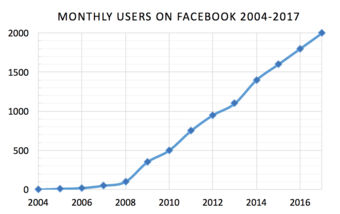History of Facebook(Reception)
Reception
According to comScore, Facebook is the leading social networking site based on monthly unique visitors, having overtaken main competitor MySpace in April 2008.[185] ComScore reports that Facebook attracted 130 million unique visitors in May 2010, an increase of 8.6 million people.[186] According to Alexa, the website's ranking among all websites increased from 60th to 7th in worldwide traffic, from September 2006 to September 2007, and is currently 2nd.[187] Quantcast ranks the website 2nd in the U.S. in traffic,[188] and Compete.com ranks it 2nd in the U.S.[189] The website is the most popular for uploading photos, with 50 billion uploaded cumulatively.[190] In 2010, Sophos's "Security Threat Report 2010" polled over 500 firms, 60% of which responded that they believed that Facebook was the social network that posed the biggest threat to security, well ahead of MySpace, Twitter, and LinkedIn.[176]
Facebook is the most popular social networking site in several English-speaking countries, including Canada,[191] the United Kingdom,[192] and the United States.[193][194][195][196] In regional Internet markets, Facebook penetration is highest in North America (69 percent), followed by Middle East-Africa (67 percent), Latin America (58 percent), Europe (57 percent), and Asia-Pacific (17 percent).[197] Some of the top competitors were listed in 2007 by Mashable.[198]
The website has won awards such as placement into the "Top 100 Classic Websites" by PC Magazine in 2007,[199] and winning the "People's Voice Award" from the Webby Awards in 2008.[200]In a 2006 study conducted by Student Monitor, a New Jersey-based company specializing in research concerning the college student market, Facebook was named the second most popular thing among undergraduates, tied with beer and only ranked lower than the iPod.[201]
On March 2010, Judge Richard Seeborg issued an order approving the class settlement in Lane v. Facebook, Inc.,[202] the class action lawsuit arising out of Facebook's Beacon program.
In 2010, Facebook won the Crunchie "Best Overall Startup Or Product" for the third year in a row[203] and was recognized as one of the "Hottest Silicon Valley Companies" by Lead411.[204]However, in a July 2010 survey performed by the American Customer Satisfaction Index, Facebook received a score of 64 out of 100, placing it in the bottom 5% of all private-sector companies in terms of customer satisfaction, alongside industries such as the IRS e-file system, airlines, and cable companies. The reasons why Facebook scored so poorly include privacy problems, frequent changes to the website's interface, the results returned by the News Feed, and spam.[205]
| Date | Users (in millions) | Days later | Monthly growth[N 2] |
|---|---|---|---|
| August 26, 2008 | 100[206] | 1,665 | 178.38% |
| April 8, 2009 | 200[207] | 225 | 13.33% |
| September 15, 2009 | 300[208] | 160 | 9.38% |
| February 5, 2010 | 400[209] | 143 | 6.99% |
| July 21, 2010 | 500[210] | 166 | 4.52% |
| January 5, 2011 | 600[211][N 3] | 168 | 3.57% |
| May 30, 2011 | 700[212] | 145 | 3.45% |
| September 22, 2011 | 800[213] | 115 | 3.73% |
| April 24, 2012 | 900[214] | 215 | 1.74% |
| October 4, 2012 | 1,000[215] | 163 | 2.04% |
| March 31, 2013 | 1,110[6] | 178 | 1.67% |
In December 2008, the Supreme Court of the Australian Capital Territory ruled that Facebook is a valid protocol to serve court notices to defendants. It is believed to be the world's first legal judgement that defines a summons posted on Facebook as legally binding.[216] In March 2009, the New Zealand High Court associate justice David Gendall allowed for the serving of legal papers on Craig Axe by the company Axe Market Garden via Facebook.[217][218] Employers (such as Virgin Atlantic Airways) have also used Facebook as a means to keep tabs on their employees and have even been known to fire them over posts they have made.[219]
By 2005, the use of Facebook had already become so ubiquitous that the generic verb "facebooking" had come into use to describe the process of browsing others' profiles or updating one's own.[220] In 2008, Collins English Dictionary declared "Facebook" as its new Word of the Year.[221] In December 2009, the New Oxford American Dictionary declared its word of the year to be the verb "unfriend", defined as "To remove someone as a 'friend' on a social networking site such as Facebook. As in, 'I decided to unfriend my roommate on Facebook after we had a fight.'"[222]
In early 2010, Openbook was established, an avowed parody (and privacy advocacy) website[223] that enables text-based searches of those Wall posts that are available to "Everyone", i.e. to everyone on the Internet.
Writers for The Wall Street Journal found in 2010 that Facebook apps were transmitting identifying information to "dozens of advertising and Internet tracking companies". The apps used an HTTP referrer which exposed the user's identity and sometimes their friends'. Facebook said, "We have taken immediate action to disable all applications that violate our terms".[224]
In January 2013, the countries with the most Facebook users were:[225]
- United States with 168.8 million members
- Brazil with 64.6 million members
- India with 62.6 million members
- Indonesia with 51.4 million members
- Mexico with 40.2 million members
All of the above total 309 million members or about 38.6 percent of Facebook's 1 billion worldwide members.[226] As of March 2013, Facebook reported having 1.11 billion monthly active users, globally.[227]
In regards to Facebook's mobile usage, per an analyst report in early 2013, there are 192 million Android users, 147 million iPhone users, 48 million iPad users and 56 million messenger users, and a total of 604 million mobile Facebook users.[228]


Comments
Post a Comment